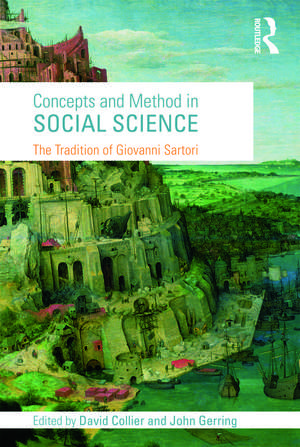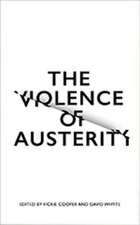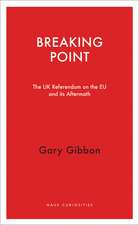Concepts and Method in Social Science: The Tradition of Giovanni Sartori
Editat de David Collier, John Gerringen Limba Engleză Paperback – 15 dec 2008
In this volume, major writings of Sartori are juxtaposed with other work that exemplifies important approaches to concept analysis. The book is organized into three key sections:
- Part I : Sartori on Concepts and Methods – including an examination of the necessary logical steps in moving from conceptualization to measurement and the relationships among meanings, terms and observations.
- Part II: Extending the Sartori Tradition – eminent scholars analyse five key ideas in concept analysis: revolution, culture, democracy, peasants and institutionalization within the context of the Sartori tradition.
- Part III: In the Academy and Beyond – both an engaging autobiographical essay written by Giovanni Sartori and reflections from former students provide a unique context in which to situate this varied and rigorous discussion of concept analysis and qualitative methods.
| Toate formatele și edițiile | Preț | Express |
|---|---|---|
| Paperback (1) | 392.09 lei 6-8 săpt. | |
| Taylor & Francis – 15 dec 2008 | 392.09 lei 6-8 săpt. | |
| Hardback (1) | 1311.22 lei 6-8 săpt. | |
| Taylor & Francis – 15 dec 2008 | 1311.22 lei 6-8 săpt. |
Preț: 392.09 lei
Nou
Puncte Express: 588
Preț estimativ în valută:
75.05€ • 78.69$ • 62.01£
75.05€ • 78.69$ • 62.01£
Carte tipărită la comandă
Livrare economică 29 ianuarie-12 februarie 25
Preluare comenzi: 021 569.72.76
Specificații
ISBN-13: 9780415775786
ISBN-10: 0415775787
Pagini: 380
Ilustrații: 23 black & white illustrations, 11 black & white tables, 23 black & white line drawings
Dimensiuni: 156 x 234 x 23 mm
Greutate: 0.7 kg
Ediția:New.
Editura: Taylor & Francis
Colecția Routledge
Locul publicării:Oxford, United Kingdom
ISBN-10: 0415775787
Pagini: 380
Ilustrații: 23 black & white illustrations, 11 black & white tables, 23 black & white line drawings
Dimensiuni: 156 x 234 x 23 mm
Greutate: 0.7 kg
Ediția:New.
Editura: Taylor & Francis
Colecția Routledge
Locul publicării:Oxford, United Kingdom
Public țintă
Postgraduate and UndergraduateCuprins
Introduction David Collier and John Gerring Part I: Sartori on Concepts and Methods 1. Concept Misformation in Comparative Politics 2. What is Politics? 3. The Tower of Babel 4. Guidelines for Concept Analysis 5. Comparing and Miscomparing 6. Excerpts on Concepts, Definitions, and Models: Democracy:"What Is" vs. "How Much", From Classification to Measurement, Politics as Collectivized Decisions, Model Mania Part II: Extending the Sartori Tradition 7. Point of Departure: Intension and Extension Gary Goertz 8. Revolution: Untangling Alternative Meanings Cristoph Kotowski 9. Culture: Joining Minimal Definitions and Ideal Types John Gerring and Paul Barresi 10. Democracy; Conceptual Hierarchies in Comparative Research David Collier and Steven Levitsky 11. Peasant: Clarifying Meaning and Refining Explanation Marcus Kurtz 12. Institutionalization: Unpacking the Concept and Explaining Party Change Steven Levitsky Part III: In the Academy and Beyond 13. Chance, Luck and Stubbornness: An Autobiographical Essay Giovanni Sartori 14. Teacher and Mentor Cindy Skach, Edward Walker, Hector Schamis Edward Gibson and Christoph Kotowski 15. Biography and Bibliography Oreste Massari
Recenzii
'Combining the best of Continental European historical perspective and Anglo-American analytical focus, this is the most challenging inquiry into the rigorous understanding of concepts to be published in recent years.'
Mauro Calise, University of Naples and Theodore J. Lowi, Cornell University, authors of Hyperpolitics: An Interactive Dictionary of Political Science
'While much social scientific ink has been spilled over questions of causal inference, such analysis is irrelevant if we do not know what it is we are studying or measuring. Sartori's scholarship is centrally concerned with these challenges, and they are squarely addressed in this book. The volume must be seen in the context of the phenomenally successful resurgence of training in qualitative and multi-method research – and it will be critical for graduate students and scholars not simply in qualitative methods, but also in research design and comparative analysis more generally.'
Evan Lieberman, Princeton University
'This is an all-star cast, and the scholarship is outstanding. Sartori is a pioneer in methodology; Collier and Gerring are central figures in the recent renaissance of qualitative methods and have wide experience in presenting technical material to students; and the authors of other chapters are well known for their high-quality scholarship. The book can profitably be read and digested by advanced undergraduates, graduate students, and established scholars.'
David Waldner, University of Virginia
'Giovanni Sartori calls for researchers to be ‘conscious thinkers’ who engage deeply with issues of method, yet are not paralyzed by preoccupation with particular techniques. This volume exemplifies Sartori’s approach by bringing together his major essays on concepts and method, along with chapters that show how his framework informs some of the best contemporary social science, and correspondingly yields valuable insights into a series of important substantive topics. Scholars at any stage of their careers should take seriously the insights of this volume.'
Melani Cammett, Brown University
'Collier and Gerring have done a great service to the profession by republishing some of Sartori’s seminal contributions on concept analysis (and beyond), together with essays of younger scholars who brilliantly continue his tradition in comparative politics. A timely and important contribution to the debate to social science methodology, this book will be compulsory reading – or re-reading – for comparativists.'
Giovanni Capoccia, Professor of Comparative Politics, Oxford
Mauro Calise, University of Naples and Theodore J. Lowi, Cornell University, authors of Hyperpolitics: An Interactive Dictionary of Political Science
'While much social scientific ink has been spilled over questions of causal inference, such analysis is irrelevant if we do not know what it is we are studying or measuring. Sartori's scholarship is centrally concerned with these challenges, and they are squarely addressed in this book. The volume must be seen in the context of the phenomenally successful resurgence of training in qualitative and multi-method research – and it will be critical for graduate students and scholars not simply in qualitative methods, but also in research design and comparative analysis more generally.'
Evan Lieberman, Princeton University
'This is an all-star cast, and the scholarship is outstanding. Sartori is a pioneer in methodology; Collier and Gerring are central figures in the recent renaissance of qualitative methods and have wide experience in presenting technical material to students; and the authors of other chapters are well known for their high-quality scholarship. The book can profitably be read and digested by advanced undergraduates, graduate students, and established scholars.'
David Waldner, University of Virginia
'Giovanni Sartori calls for researchers to be ‘conscious thinkers’ who engage deeply with issues of method, yet are not paralyzed by preoccupation with particular techniques. This volume exemplifies Sartori’s approach by bringing together his major essays on concepts and method, along with chapters that show how his framework informs some of the best contemporary social science, and correspondingly yields valuable insights into a series of important substantive topics. Scholars at any stage of their careers should take seriously the insights of this volume.'
Melani Cammett, Brown University
'Collier and Gerring have done a great service to the profession by republishing some of Sartori’s seminal contributions on concept analysis (and beyond), together with essays of younger scholars who brilliantly continue his tradition in comparative politics. A timely and important contribution to the debate to social science methodology, this book will be compulsory reading – or re-reading – for comparativists.'
Giovanni Capoccia, Professor of Comparative Politics, Oxford
Descriere
Drawing on the intellectual tradition of the leading comparative political science scholar, Giovanni Sartori, the contributors examine the theoretical and methodological basis of: Concept Analysis, Comparative Political Analysis and Qualitative Methods.
















